A Grave for Two Read online
Page 3
Selma felt her pulse race. She breathed more quietly, concentrating, and regained control.
‘That’s sheer madness, Jan. We have an agreement. One: I pay back the money.’
She used the fingers of her right hand to count on her left.
‘Two: I hand back my licence to practise law. Three: I must never gamble again. Nothing. At all. The quid pro quo is that you don’t report me. Quite a …’
Darius leapt on to the settee, circling himself soundlessly a couple of times before lying down.
‘… rough deal,’ Selma rounded off.
He opened his mouth and she held up her palms to stop him.
‘Strict,’ he nevertheless went on to say. ‘But fair.’
She placed the cushion as a buffer between her and the cat.
‘Fine,’ she said, with a note of resignation. ‘But an agreement like that makes it totally impossible for me to work for you. You’ll realize that, if you think about it.’
‘Look on it as a bet,’ he said sharply. ‘Your very last one. If you find the explanation for how and why an honest, clean, elite athlete has quite inexplicably tested positive and risks losing the greatest experience of her life, then you’ll get your money back.’
‘PyeongChang.’
‘Yes.’
‘No cure, no pay?’
‘Yes. Only then will it really be a bet. You have until the very last selection date. 24 January 2018. If you succeed, the money’s yours. Sixteen million. Many of your problems could be fixed for sixteen million kroner, Selma. Especially since three of them represent debt you have nothing to show for. If you don’t succeed, then both you and I will have wasted our time.’
‘But why me?’
Jan Morell gave a faint smile.
‘Look at yourself in the mirror,’ he said with a touch of contempt. ‘Read your own CV. If anyone is able to get to the bottom of this, it’s you. A top athlete. A top lawyer. You took on three famous drugs cases and won two of them. Into the bargain, you’re one of Norway’s most famous faces and admired role models.’
‘Former top athlete,’ she corrected him. ‘And from Monday on, also an ex-lawyer. Probably also a far less famous face. From now on, at least.’
Holding out his hand, he pretended not to hear her.
‘Do we have a deal?’
Selma got to her feet. Stared at his hand without taking it in hers. Darius jumped warily down to the floor again, with his eyes fixed on the mouse, now lying stone dead in the middle of the floor.
‘I don’t even know where to begin,’ Selma said hesitantly.
‘By coming with me,’ Jan Morell told her, retracting his hand and heading for the door. ‘You have to speak to Hege.’
Only now did he catch sight of the mouse and stopped short.
‘What kind of place is this?’ he exclaimed, taking a step back. ‘And what the hell’s that cat doing here?’
‘It’s a long story,’ Selma said curtly, circumnavigating the mouse cadaver as she went to collect her outdoor clothes. ‘I have to do something first. I can be at your place in a couple of hours.’
A swift glance at the Rolex. Yet another item she would try to keep for as long as possible, it struck her. In reserve, of course: a watch like that would fetch a good price on eBay.
‘Before midnight. OK?’
‘Yes.’
‘And …’
‘Yes?’
‘You’ll have to cover all expenses.’
Irritation, possibly anger, crossed his face.
‘Within reasonable limits,’ he finally said. ‘Do you take the job?’
‘I accept your bet. With no particular belief that I’ll be able to win. Have you considered at all that she might in fact be guilty?’
‘She’s not. I know that. Anyway, you forgot one point.’
‘What?’
‘In our agreement. Point four. You’ll provide me with written confirmation from a licensed psychologist or psychiatrist that you’re receiving treatment.’
Now Selma was the one to freeze.
‘That point will have to be deleted.’
‘Out of the question.’
She hung her jacket back on the hook. The tiny hallway was unlit. Only the open door into the living room made it possible for them to see the contours of each other’s face.
‘I’ll never consult a psychologist, Jan.’
‘Yes, you will. Ask Vanja Vegge for advice. Isn’t she a good friend of yours? If you don’t do that, I’m happy to inform you that the formal complaint is ready and waiting in my safe.’
She stared at him. Was met by a blue gaze, brimming with success, arrogance and wealth. Despite being scarcely five foot eight, Jan Morell was a man at his full height. He usually got his own way.
‘No,’ she said firmly.
‘Your choice,’ he said brusquely, putting his hand on the door chain. ‘The formal complaint will be delivered on Monday.’
The door slammed behind him.
Darius meowed.
Selma Falck hesitated for a few seconds. Grabbed her jacket and dashed out into the stairwell.
‘Jan!’
Fortunately, he had waited for her beside the mailboxes.
THE HIDING PLACE
The first thought that came to Hege, when she no longer felt she had to throw up, was to call her father. The second thought struck her before she located her phone:
What one person knows, nobody knows. What two people know, everybody knows.
It was her father’s mantra. Ever since she, as a tiny, deadly serious bundle, had been collected from China, Jan Morell had instilled in her that she should never trust anyone. No one. Except for him and Katinka, Hege Chin’s Norwegian mother.
You can never trust anyone except the people who put you before themselves. No one other than those who love you. Only Mum and I do. Remember that.
Mum had always smiled indulgently, rolling her eyes slightly, and tried to make him listen to reason. Most people were dependable, Hege should know. On the whole, people wished one another well. That was how she lived, Katinka Morell. That was what she was like, and that was how she died after a hospital blunder her widower pursued at great lengths through the legal system. Eventually receiving three million kroner in compensation. The money was invested in a trust for Hege, who was eleven years old at that time. Not that she would ever need it, as Jan Morell’s only child.
The writing on the box shone out at her. She had perched it on the edge of the wash-hand basin. It crossed her mind that she had touched it, and she picked it up with a hankie and began to rub away the fingerprints that must be all over it. The packaging fell apart, becoming flat and misshapen, and the lid opened up at one end.
The text was in Italian.
Hege had been to Italy. With the national team. At the end of August, beginning of September.
The tube itself slid out of the package and fell to the floor.
What one person knows, nobody knows.
Dad and Hege were as one. It was always the two of them. In a sense it always had been, at least after Mum’s death when the skiing had taken the upper hand for them both. They had used training to eradicate their sorrow. Tried, at least. Skated through Nordmarka in winter, ran in summer, used roller skis, treadmill, weights and a stopwatch to flee from a death neither of them had seen coming and also never succeeded in running away from.
They were two sides of the same coin.
But Dad always thought on his feet. He was so quick thinking, so fast that he always stole a march on everyone else and for that reason he was always allowed to choose the trail. He was proud, almost boastful, of being called Pathfinder as a child, when he was the best at skiing among all the youngsters in his neighbourhood, despite using old wooden skis with Kandahar bindings far longer than all the others.
He was going to do something. At once. Move heaven and earth to find out who had compromised Hege’s luggage. He would take one look at the tube of ointment, bark out some sp
ecific questions and dash to the door again. Dad always did something. Took action. PDQ and on the double.
Hege didn’t want anything to be done. She wanted the tube of Trofodermin to disappear by itself. All this should just vanish, and she picked up the tube. The lid unscrewed with a barely audible click. After turning the cap, she pierced a hole in the foil seal over the opening. She lifted the toilet seat lid and squirted the ointment down into the bluish, fragrant water. She used her finger and thumb to squeeze the tube three times from bottom to top. Carefully, to avoid getting any on her fingers. The sticky mass disappeared down into the blue void, and when it proved impossible to press out any more, she flushed three times. Vigorously deployed the toilet brush and flushed yet again.
Her breathing was steadier now.
She fetched a lighter from the small table with candleholders in the living room. Back in the bathroom, she held the packaging above the toilet bowl and set it alight. Let it burn until it singed her fingertips. Dropped it. Flushed it away.
The tube was made of metal. Perhaps it could be melted at a high temperature. In the fireplace, maybe, but none of the fires were lit now. Following a period resembling winter at the beginning of November, mild weather had set in, turning their existence grey and wet. Even up here on the heights. The fireplaces, both the one in the kitchen and the big hearth in the living room, were never used unless it was really cold. That was also a change since Mum died; Katinka Morell would even light the fire to roast marshmallows in the middle of summer.
Dad had a more practical bent.
The purpose of the fireplaces was to heat up the rooms, and now and again for decoration when they had company.
She would have to wait. Without giving much thought to what she was doing, she put down the toilet seat lid, stepped up on top of it with the empty tube in her hand and unhooked the ventilation grille. When she was younger, she had hidden her diary in here, a notebook so full of trivialities that it now lay in the drawer of her bedside table, with nothing being written for years on end. She hurriedly thrust the tube into the round duct, as far inside as possible, and put the grille back in place again. The catch had loosened, she noticed; in her early teens she had gone in there on a daily basis.
Dad thought the bathroom should be renovated. Until now Hege had flatly refused. The room would soon be completely antiquated, he argued, and something should be done in consideration for the value of the house. But there was still a bit of Mum about the bathroom, something Dad failed to notice. A heart, neatly painted in nail varnish on a tile just beside the door. Hege’s height marked on the doorframe. Lines with dates written in various pens with big exclamation marks when she’d had a growth spurt.
If the bathroom were renovated, Hege imagined, she might sneak the empty tube into the floor cement.
She gave herself a slap on the ear at the idiotic idea. This couldn’t wait. The tube would have to be disposed of as fast as possible, but in the meantime it could stay where it was. She would think of something.
What one person knows, nobody knows.
No one knew that she could have been caught red-handed with a banned medication in her toiletry bag, traces of which substance had been found in her own body. She let the water in the basin run until it was red-hot, and held her hands under the flow until they were crimson.
Maybe she had done something terribly stupid. It wasn’t really possible to ingest drugs through an ointment for wounds. But, technically speaking, of course, it was. From a formal point of view, traces of this ointment could bring her down, and the tube could be the proof she needed at least to be able to blame something. Something far less damning than systematic use of a performance-enhancing drug.
The problem was simply that she had never used that bloody cream. An even greater problem was that someone had tried to make it look as if she had done so.
She should, of course, have gone straight to Dad.
Now it was too late, and she went down to the basement to run on the treadmill.
THE DOWN-AND-OUT
He lived in a cardboard box from IKEA.
It was large and had contained a settee called Stockholm. To tell the truth, Einar Falsen lived in several boxes, of varying sizes, in four different places around Oslo.
This particular abode was situated under the Sinsen interchange and was his usual haunt during Advent. The other shacks made of cardboard, scrap wood and bushes were dotted around the wilderness region of Oslomarka, two of them pretty close to populated areas, one of them close to the Katnosa Lake. He headed there during good weather in summer and could stay there for weeks at a time. He got by on what he found. Both in the landscape and at picnic spots, it was really unbelievable what people left behind, even so far inside Marka that only really experienced hikers ventured here. One or two outdoor fanatics eventually got to know him and slipped him a sausage or a few slices of crispbread on their way home through the forest.
Approaching Christmas he settled every year beneath Norway’s busiest traffic machine. More than a hundred thousand vehicles thundered above his head twenty-four hours a day, which he found soothing. This hiding place behind the colossal piles of aggregates and boulders had belonged to him for many years now. It had seemed under threat when the Roma people made their entry into Norway in 2013. Politicians were enraged and set the cops on them. Einar Falsen was allowed to stay as soon as the young, gruff uniformed officers understood who he was. That pre-Christmas period was good, because they brought him coffee prior to repeatedly chasing the gypsies off to a series of different night shelters. Last year some of the seedy Romanians returned, but they kept a safe distance with all their bags and baggage down by the new football pitch at Muselunden.
Einar Falsen was seldom cold.
Cardboard and newspapers, an old sleeping bag, layer upon layer of clothes he regularly fished out of damaged UFF secondhand clothing containers. Aluminium foil and an enormous hat with earflaps. The sum total normally kept out the cold.
But he was hungry. It was fairly late, he thought – the rumble of heavy traffic above his head had abated somewhat. Selma should have been here by now. He pulled off his mittens and took the old mobile phone out from his chest, close to his skin, packed in an old sock wrapped thoroughly in three layers of silver paper to ensure the phone didn’t kill him.
The mobile was an old Nokia 1100, and he’d received it as a present. It contained one saved phone number, and he used it very rarely. Selma was the one who had insisted on giving him the opportunity to contact her. Cordless phones were dangerous, he was well aware of that, but Selma had guaranteed that this particular model was safer than any other. It was nonsense, of course, since in the first place mobile phones emitted cancer-producing radiation, and secondly they were under surveillance by the Norwegian security services and the CIA, one and all. After a great deal of persuasion, he had nevertheless gone along with ‘taking care of it’, as she had put it; it could hardly cause any harm when he almost never switched it on. She should have been here at ten p.m., the message confirmed. It was now twenty-three minutes to eleven.
Selma was the only one he had.
And there she came.
Einar loved the way she walked. Supple, as if she were constantly ready to break into a run. In the glow from the Maxbo billboards at the foot of the interchange and the floodlights on the football field to the north-east, he could see her nimbly jumping from one boulder to the next. They were slippery these days, he had experienced that for himself last night when he had fallen and given himself a nasty knock on the way home from a round of begging, but Selma moved like a dancer.
She was born in 1966, he knew. Fifty years old last September.
Selma moved as if she were twenty-five.
‘Hi, Einar. Sorry I’m a bit late.’
‘I’m not going anywhere,’ he said with a smile. ‘At least you came, Mariska.’
She returned his smile and began to root around in the bag she carried in her right hand.
> ‘Here. A fully charged power bank. Give me the empty one, please.’
Einar produced the heavy little energy supply for his mobile phone and gave it to her in exchange. Both the empty one and the full one were encased in bubble wrap and a sock.
‘And here you are,’ she said, sitting down as she unpacked a sandwich from Deli de Luca. ‘Cheese and ham with an extra dollop of red pepper. Sorry, but I didn’t have time to fill a thermos of coffee, so …’
She handed him a giant-sized cardboard beaker wrapped in napkins and sealed with tape.
‘Probably not hot any more.’
‘Doesn’t matter. What’s wrong?’
‘Wrong?’
‘Yes. You’ve been so stressed out lately. Now there’s definitely something bothering you.’
‘No, there’s not.’
‘I recognize that look of yours. Is it something at work?’
He guzzled down half the contents of the beaker without waiting for an answer.
‘No, of course not,’ she said casually as he drank. ‘Just lots to do.’
‘And the family?’
‘Absolutely fine. The kids are so busy I hardly see them. It’s only Johannes living at home these days. He’s got a lot on his plate. You know how it is.’
Einar Falsen stood up, unsteady through rheumatism and eleven years as a down-and-out. He stretched his arms up into the air with a grimace before shaking his legs, one at a time.
‘This isn’t us, Mariska. We don’t sit here lying to each other. If there are things you don’t want to talk to me about, that’s fine. But don’t tell lies.’
‘I’ve been given a case,’ she said quickly.
‘I assume you get cases all the time.’
He sat down again, on a pile of newspapers and with the rolled-up sleeping bag at his back.
‘It’s actually not as a lawyer that I’ve received this particular case,’ she said, taking a bottle of cola from her pocket. ‘I’ve to be more of a sort of … investigator, in a sense.’
‘You? Investigate? You’re a lawyer, damn it.’

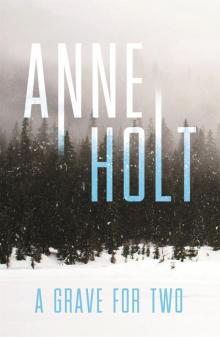 A Grave for Two
A Grave for Two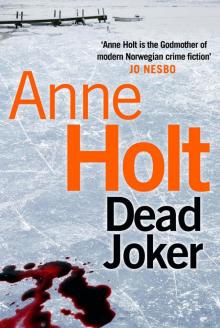 Dead Joker
Dead Joker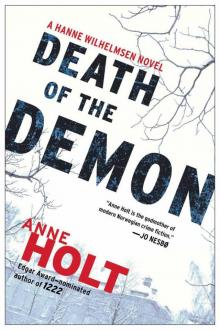 Death of the Demon: A Hanne Wilhelmsen Novel
Death of the Demon: A Hanne Wilhelmsen Novel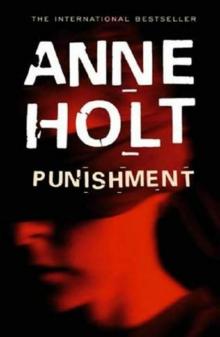 Punishment aka What Is Mine
Punishment aka What Is Mine Beyond the Truth
Beyond the Truth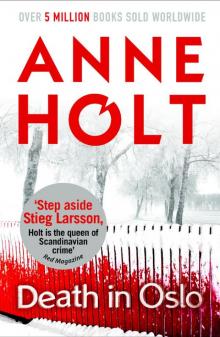 Death in Oslo
Death in Oslo The Blind Goddess
The Blind Goddess What Never Happens
What Never Happens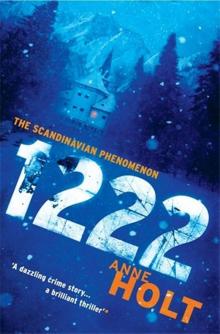 1222
1222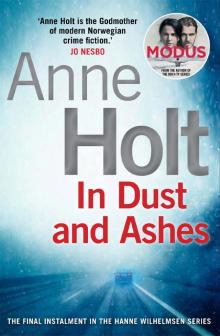 In Dust and Ashes
In Dust and Ashes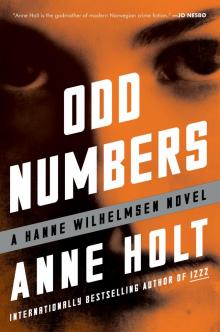 Odd Numbers
Odd Numbers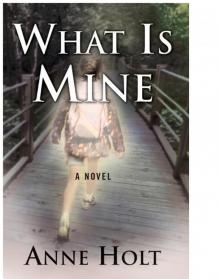 What is Mine
What is Mine What Dark Clouds Hide
What Dark Clouds Hide Blessed Are Those Who Thirst
Blessed Are Those Who Thirst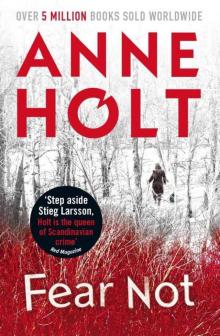 Fear Not
Fear Not No Echo
No Echo Hanne Wilhelmsen - 01 - The Blind Goddess
Hanne Wilhelmsen - 01 - The Blind Goddess